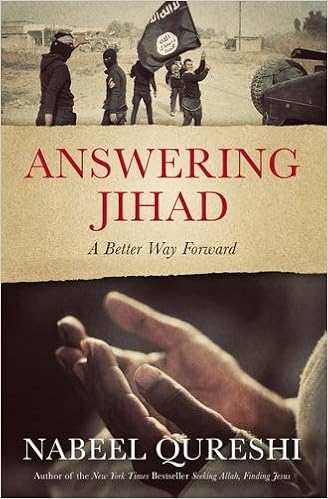
Answering
Jihad by Nabeel Qureshi
How do we address the concept of Jihad as we see it
in our culture and from the lips of those espousing its proliferation? Apologist and author Nabeel Qureshi in his
new book, Answering Jihad, guides us through some very important questions and
answers concerning this belief in a scintillating and no-nonsense way. What you will find is answers to your
questions about jihad, the Crusades, radical Islam and many other important
beliefs and practices regarding Islam.
Born into a Muslim American family, Nabeel tells his story as well,
growing up in a rather peaceful Muslim family unit and not knowing nor
investigating some of the Quranic roots of the Islamic faith, some of those
involving violence.
Part of my surprise in the book was learning about
the roots of radical Islam and how their beliefs and ideas differ from those
who rest on contemporary Muslim jurisprudence.
Nabeel writes concerning Sayyid Qutb, “Qutb saw the leaders of foreign
countries as hypocrites and apostates, no longer following Islam. They were part of the problem. If Muslims would but follow the original,
pure Islam, Allah would bless all the Muslims, the ummah, and return them to
dominance (71).” Part of the outrage coming
from Qutb was seeing these so-called Islamic countries courting Western ideas,
including democracy. Yet, this was only
part of the problem. The main issue was
that these countries and leaders were not on the same page as Qutb, they relied
too heavily on contemporary Muslim jurists thought including jurisprudence and
not primarily or even solely on the Quran and the most reliable hadith. In other words, the outrage in some ways
amounted to two people carrying on a conversation that has its starting and
ending points on two entirely different planes, thus miscommunication and
breakdowns were and are inevitable.
One of the most helpful things Nabeel did in the
book was point his readers to the actual texts in the Quran, hadith, and the
Bible to make his case in answering the questions. For instance, in writing about early concept
of Jihad in the Quran, Nabeel quotes from 2:216-18 that, “Warfare is prescribed
for you, though you dislike it…Behold, those who believe, emigrate, and
undertake jihad, these have hope of the mercy of Allah.” Now, there is interpretive differences
between those who understand jihad in the sense of spiritual struggle, but
there is still corroboration with the hadith which says, “I have been made
victorious through terror (35-37).”
Nabeel carefully draws us into a full range of texts to make his point,
a method that is to be commended. Even
when he looks at violence in the OT, he is careful to distinguish that type of
violence that God commanded and that which was taken up by Israel.
I appreciated Nabeel’s grace in this book, his
willingness to not decry all Muslims as having evil intentions and actions,
while truthfully investigating the roots of violence in the Quran and in
Muhammad’s life. This book will certainly
get people talking and investigating the truth for themselves.
Thanks to BookLookBloggers for the copy of this book
in exchange for an honest review.
Comments
Post a Comment